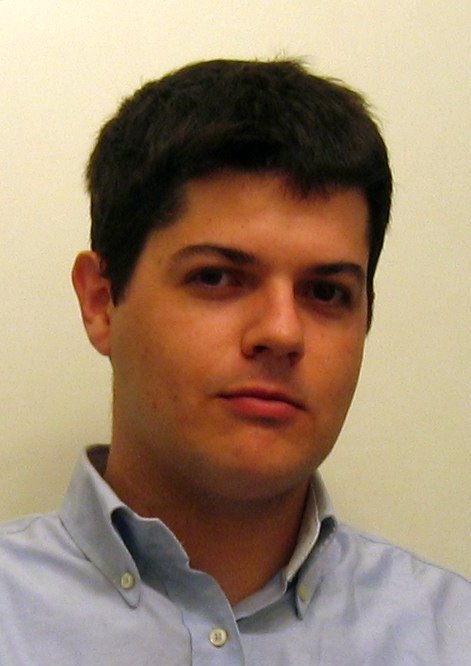Saturday, May 20, 2006
Denominaciones
La primera enmienda de la Constitución de Estados Unidos garantiza la libertad de religión y prohibe el establecimiento de una religión como religión nacional:
Los norteamericanos se han tomado esto tan en serio que lo han llevado al extremo. Según un estudio realizado en el 2001, esta es la distribución estadística de las principales "denominaciones" (que es como los americanos llaman a los diferentes tipos de cristianismo) en EEUU:



Claro, con tantas religiones, algunos se lían y no acaban de tener claras las diferencias entre unas religiones y otras. Esta página web intenta aclarar estas diferencias:
Y aquí el origen del Calvinismo:
También hay diversidad de opiniones sobre la Trinidad:
Otro día escribiré sobre las religiones más "divertidas" de EEUU: los mormones y los practicantes de la cienciología...
Congress shall make no law respecting an establishment of religion, or prohibiting the free exercise thereof; or abridging the freedom of speech, or of the press; or the right of the people peaceably to assemble, and to petition the Government for a redress of grievances.
Los norteamericanos se han tomado esto tan en serio que lo han llevado al extremo. Según un estudio realizado en el 2001, esta es la distribución estadística de las principales "denominaciones" (que es como los americanos llaman a los diferentes tipos de cristianismo) en EEUU:
- Cristianos (79.8%), de los cuales:
- Católicos (25.9%)
- Baptistas (17.2%)
- Metodistas (7.2%)
- Cristianos sin Denominación (7.2%)
- Luteranos (4.9%)
- Presbiterianos (2.8%)
- Protestantes sin Denominación (2.4%)
- Pentecostales/Carismáticos (2.2%)
- Episcopalianos/Anglicanos (1.8%)
- Mormones/Santos de los Últimos Días (1.4%)
- Iglesias de Cristo (1.3%)
- Congregacionales (0.7%)
- Testigos de Jehova (0.7%)
- etc.
- Otras religiones (5.2%)
- Sin religión/ateos/agnósticos (15%)



Claro, con tantas religiones, algunos se lían y no acaban de tener claras las diferencias entre unas religiones y otras. Esta página web intenta aclarar estas diferencias:
To be fair to these perplexed and terrified people, Christians are not easy to understand. To begin with, there are roughly 2,000 years of history to grasp, and certainly more denominations and subdivisions than that to take on board. For people who were raised secular, I imagine it's like trying to understand an opera after coming in halfway before the end: the stage is crowded with people, two of them seem to be dead, a woman is wearing a hat with horns, and everyone is making a terrible racket.Aquí aclara el origen histórico del cisma entre Catolicismo y Protestantismo:
The Protestant Reformation
This is the name historians give to a major labor dispute that erupted in Germany in 1517 when a group of monks hammered a proposed union contract to the door of the pope's house, requesting a 95 percent pay raise. The pope refused to negotiate with the monks union until it agreed to pay to have the door fixed, and the result was the world's longest-running strike. For nearly 500 years, a huge portion of Christians have been on strike from being Catholic, saying they are "justified" in their work stoppage because the pope won't expand the number of indulgences they get per year. Currently, the matter is in arbitration.
Y aquí el origen del Calvinismo:
CalvinismLas diferentes denominaciones tienen diferentes opiniones sobre si el bautismo tiene efectos "iniciáticos" reales o sólo simbólicos, o sobre quién puede realizar un bautismo:
This theory was worked out by the French theologian and fashion designer John Calvin Klein, who argued that some people are predestined to be glamorous while others are doomed to be plain. America was founded by Calvinists, who sought to establish a country where they could pursue their belief that buckled hats were fashionable.
Baptism
[...]"Baptism" is also the term used to describe a key Christian ceremony, in which prospective members of the church are either initiated actually (Catholics, Orthodox, confused Protestants) or symbolically (Protestants, confused Catholics, religious studies professors). Catholics believe that anyone can perform a valid baptism, Orthodox believe that any Christian can, while Baptists, paradoxically, believe that only they can.
También hay diversidad de opiniones sobre la Trinidad:
The Trinity
This is the Christian expression of God, who Christians say is personified by the Father, Son, and Holy Spirit. Not all Christians accept this: Unitarians, Jehovah's Witnesses, and some Pentecostals reject trinitarianism, as do Muslims. Interestingly, while this does not mean Pentecostals are Muslim, it does mean that Muslims are Jehovah's Witnesses.
Otro día escribiré sobre las religiones más "divertidas" de EEUU: los mormones y los practicantes de la cienciología...

